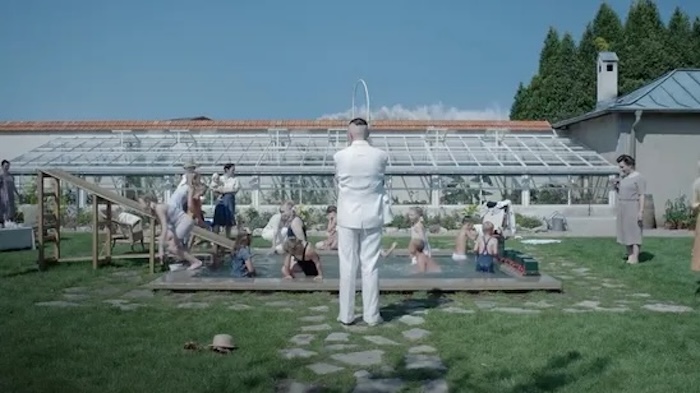
By now everyone knows how director Jonathan Glazer keeps the horrors of the Auschwitz death camp out of sight in his movie about the commandant of the camp, Rudolf Höss (Christian Friedel), and his family, who live in well-appointed digs right next door. The purpose, of course, is not to show how those horrors were carried out in an efficient manner, but how the success of Höss’s administrative ideas made his family’s life pleasant and upwardly mobile. In fact, the only overt drama in the story is how Höss becomes a victim of this success. He is promoted to the top post of concentration camp management, which means he has to move from Poland back to Germany, a transfer that his wife, Hedwig (Sandra Hüller), refuses to accommodate, since she’s put so much work into a home that she thinks she will occupy forever. At this point in the film, the cognitive dissonance has become deafening, but Hedwig’s temper tantrum at the news of the promotion pegs her as someone who has no critical faculties whatsoever—why would anyone want to spend their life a hundred yards from a factory of death?
Up to that point, however, Glazer endeavors to create a kind of idyll in the leafy environs outside the camp. Per his habit, he kept his cameras hidden during shooting, so that the actors didn’t exactly know how they were being filmed, and there’s an offhanded casualness to the performances that work to increase the creep factor. As Hedwig tries on a fur coat in the privacy of her bedroom you suddenly realize it used to belong to one of the prisoners next door, and when she then finds some lipstick in the pocket and applies it to her mouth, it’s difficult to suppress one’s gag reflex. Occasionally, someone talks about the smoke from the chimneys or muffled screams float over the wall, but for the most part the evidence of wholesale killing is implied, as when Hedwig jokes about a “Jewess” trying to hide her diamonds in some toothpaste. The most direct evidence of mass murder is Höss explaining plans for a new crematorium to a committee as if he were making a PowerPoint presentation. What’s notable in these juxtapositions is that Höss’s children and wife know full well what’s going on next door and can lead lives of simple pleasure with that knowledge. The sound of the machinery of death is ever-present, and simply becomes the soundtrack to their life of comfort.
In fact, it’s the sound design and actual score that makes the movie more than the sum of its tacit depravities. That persistent hum becomes maddening to the viewer, and Mica Levi’s Pärt-like score constantly reminds you that this is a horror movie. Glazer also throws in narrative non sequiturs that show there is resistance in the vicinity of the camp, and in the end he adds an editorial note by showing the Auschwitz memorial as it is run today, a move that baffled me, since it seems to be making the same point as the fictional sequences in that systematic work is a universal ideal. I’m sure I read that part wrong, but the rest is implacably straightforward.
In German and Polish. Opens May 24 in Tokyo at Toho Cinemas Nihonbashi (050-6868-5060), Toho Cinemas Chanter Hibiya (050-6868-5001), Shinjuku Piccadilly (050-6861-3011), Human Trust Cinema Shibuya (03-5468-5551), Toho Cinemas Roppongi Hills (050-6868-5024).
The Zone of Interest home page in Japanese
photo (c) Two Wolves Films Limited, Extreme Emotions BIS Limited, Soft Money LLC and Channel Four Television Corporation 2023
